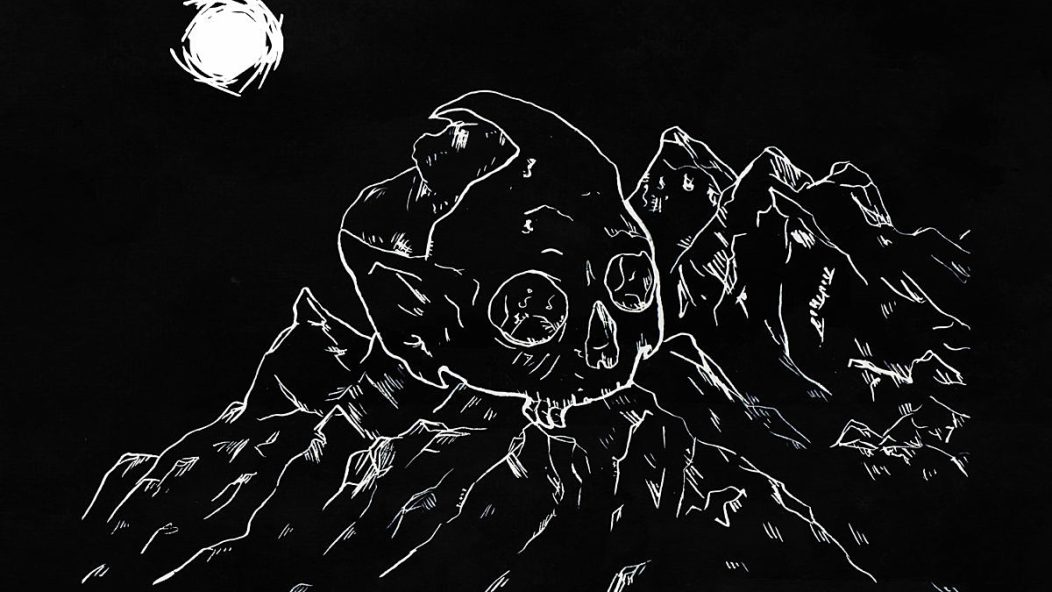
Daxma - "The Head Which Becomes The Skull"
…
Writing slow music is like zooming in on a detail of a painting. If you do it right, it opens up a whole world of nuance and subtilty that might have gone otherwise unnoticed. Go too far, though, and you end up looking at indiscernible mush. How should a band playing exclusively below marching speed keep their songs from blurring together? Interested parties should look to Oakland’s Daxma and their new album The Head Which Becomes The Skull for guidance. It’s a heady listen, citing the likes of Hegel and Kierkegaard to depict the thin line between life and death. In less steady hands The Head Which Becomes The Skull would be a wallowing dirge. Luckily for us, Daxma (formerly Dakhma) put the extra effort to make each song a distinct moment on the record’s journey.
The slower you play, the less time you have to introduce new ideas. There simply isn’t time to establish entirely new motifs when each passage takes so long to complete. This gives each decision additional weight and, consequently, an increased importance to the end product. It’s clear that this increased pressure doesn’t bother Daxma. The opening track “Birth” is a feat of patience and demonstrates confidence in their ability to hold their audience’s attention. “Birth” isn’t substantially different from the rest of The Head Which Becomes The Skull: it moves from delicacy to spine-bending heaviness, building melody through violin and guitar interplay like the rest of the album. It does feature one crucial difference: the absence of vocals. It’s the “instrumental metal intro track” taken to a logical conclusion, a sweeping 11-minute epic that doesn’t just set up the album’s mood but actively creates it.
It helps that that Daxma have just as much post-rock in their DNA as they do doom. That genre’s sense of melody gives “Birth” a focal point, but putting a wordless track right at the top is also one hell of a flex for a band with three singers. Bassist Kelly D, guitarist/violinist Jessica T., and guitarist Isaac R. each take turns hovering above the band’s expansive low-end reverberations. This flexibility is another key part of how Daxma keep each song unique. Musically, they draw from the same set of influences, but use each singer’s individual timbre to avoid monotony.
…
…
To be clear, these differences aren’t just for aesthetics, but they are an essential part of the emotional arc of the record. If the title of the record didn’t make it clear, The Head Which Becomes The Skull is a headlong descent from the beginning of life to it’s inevitable end. This could have been an excuse to ramp up the darkness until the last note, or take a page from Flying Lotus’s book and depict death as a slow descent into ambience (see: You’re Dead!). The album takes the opposite tact, becoming more approachable and melodically rich as it nears its conclusion. Each song builds on the previous one, the defiant guitar lead on “Abandoning All Hope” sets the tone for the aching arpeggiated climax of “Our Lives Will Be Erased by the Shifting Sands.” Those downcast song titles are a smoke screen for how invigorating this material can be.
Daxma aren’t rigidly devoted to that simple binary. After all, the only thing more effective than establishing a pattern is breaking that pattern with impeccable timing. The other four full songs, not counting the “Aufheben” interlude, are all variations on a theme. “The Head Which Becomes The Skull” is the moment where life slips away into nothingness, and Daxma follow suit by slipping free of the album’s rules. The song hinges on a repeating mantra of “In emptiness we are whole / In emptiness we are full.” The line is sung in two part harmony before being overtaken by a rush of blast beats, the first of the record, turning the slow fade into a freefall.
It’s a choice that works more for its boldness than its execution. The album’s middle stretch make a stronger impression, especially “Abandoning All Hope” which served as the record’s lead single, but the songs on either side of that stretch make it clear that Daxma was aiming for something conceptually richer than just a collection of songs. These bookends give shape and context to the songs in between, making them more meaningful in the process. This is another place where a younger band could learn from Daxma. Both conceptually and musically, the conclusion defines everything that came before it, spelling out the dire nature of mortality and the importance of our decisions before our inevitable end.
…
Preorder The Head Which Becomes The Skull here.
…










